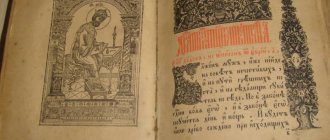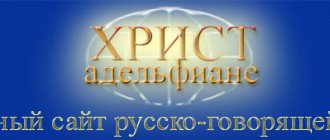The Church Slavonic language, in which services are conducted in the Russian Orthodox Church, is not understood by everyone. Especially for those who have just crossed the threshold of the temple. They often think that they need to act immediately: urgently translate all liturgical texts into modern Russian - then, they say, everything will become clear to everyone. In fact, the question is very ambiguous, there are both pros and contras. We turned to specialists - Marina Zhurinskaya and Vladimir Kirillin.
***
Marina Zhurinskaya, candidate of philological sciences, linguist, editor of the magazine “Alpha and Omega”
Under the weight of secondary meanings
— Marina Andreevna, I have heard that the Russian language is definitely worse than Church Slavonic and therefore services cannot be translated into it. Do you agree with this?
— Talking about the fact that the Church Slavonic language is better than Russian is naive talk, because in any language you can express everything that can come to a person’s mind. Reasoning that there is a word, the like of which is not found in other languages, is also quite naive - primarily because the meaning is expressed not in individual words, but in sentences. You can always say everything a person thinks with the help of one or another number of words. Arguments about the special poetry of the Church Slavonic language are also unconvincing; there is a charm of another language, and texts in it seem “more beautiful” than in their native language; Linguists have a lot of jokes about this. In addition, Pushkin’s language is also poetic, and if this is a criterion, then why don’t we now transfer the entire service into Pushkin’s embossed stanzas?
The point is different - for us the Church Slavonic language has a number of very special properties. It’s still good when the language in which services are performed is not your native one, because in the words and phrases of your native language there is a lot of what is called connotations - secondary meanings that are not contained in the text, but are born in the mind.
A simple example. In the Synodal translation of the Holy Scriptures in the Sermon on the Mount there is the word ye shall laugh (Blessed are those who weep now, for ye shall laugh. Gospel of Luke, chapter 6, verse 21). On the one hand, the Russian word “to laugh” does not exist in other contexts, but on the other hand, if it is in the Synodal translation, then it is already in the language. And now in one of the new translations of the Holy Scriptures, instead of laughing, you will laugh. But it sounds like the joke: “You will laugh, but your third daughter also died.” You can not do it this way. This is precisely what the sacred language cleanses and protects us from.
Sacral - from lat. sacrum (sacred) is the language of worship, the language of rituals. The Hittites, for example, had Palayan as their language. For Indian Buddhists it is Pali. Church Slavonic is also a sacred language, and this must be taken seriously. Of course, in Christianity, in the religion of freedom, there is no strict requirement to serve in a sacred language, and services are conducted in national languages where justified, but more on that later. And our sacred language - Church Slavonic - helps us stay in the channel in which we need to swim if we want to live in a spiritual mood and not get distracted. And the more a person attends divine services, and sometimes seriously, the closer and more understandable the Church Slavonic language is to him. Which, however, in no way cancels working with the dictionary. After all, you can attend divine services for forty years in a row, but you will never know what msheloimstvo or tristats are (Tristat - (Greek) military leader; also used in the meaning of “horseman”), because these words have no analogues and the context does not clarify them , you need to look up them in the dictionary.
— Is there a problem with the Church Slavonic language at all? If yes, then what is it expressed in?
— The problem of the Church Slavonic language, or more precisely, worship in the Church Slavonic language, is now extremely limited. This is the problem of those people who come to Church for the first time and feel somewhat confused. Sometimes this is a problem for some parishes that want to stand out from the crowd in this regard and do what is best. That is, either this is a problem of intra-church self-awareness, or it is a problem of neophytes. The second one really deserves special attention.
Let me make some clarification. The Moscow Patriarchate has many parishes abroad. In some of them, where mostly old people go (and sometimes young people, if it is customary in their family to speak Russian, thereby preserving the cultural tradition of the Russian language), the service is performed in Church Slavonic. But where the majority of parishioners are people who do not know Russian, it is allowed to serve in national languages. For example, there is a wonderful, extremely perfect translation of the liturgy into German, which was done in Germany by Archpriest Alexy Maltsev back in the 19th century. The translation into English is also very good; it is an authentic text. So it cannot be said that the Moscow Patriarchate serves only in the Church Slavonic way. And it is clear that language as such, including living modern language, is not an obstacle to Orthodox worship. It must be said, however, that the language of the German liturgical text differs from everyday language. This language is sublime, with many archaisms. It is cleared of Protestant religious vocabulary and contains words and phrases of Latin origin that were used by Catholics.
Speech or singing
The canonical reading of Orthodox prayers is a bizarre fusion of spoken language and singing. Elena Ovechkina, candidate of philological sciences, wrote about this in her article “Features of the sound of Orthodox prayers,” which was published in the Bulletin of Volgograd State University (No. 1, 2010).
The researcher noted that the technique of saying prayers accepted in Orthodoxy is called psalmody, since it was originally used for reading psalms. Actually, this is a special manner of reciting sacred texts “... consisting in intonating them on one sound.” And although psalmody cannot yet be called singing in the literal sense of the word, experts still recognize it as a kind of prototype of the vocal-melodic performance of prayer.
Some scientists believe that the monotonous chanting and recitative reading of sacred texts is closer to singing in nature, while others attribute this technique of pronouncing sacred texts to the art of recitation.
On the emergence of the Church Slavonic language
The Church Slavonic language, the successor of Old Church Slavonic, developed in the middle of the 17th century. It reflected a number of changes, mainly phonetic, that took place in the living Russian language. At the same time, its spelling was streamlined.
— But the German language of worship is more understandable to modern Germans than Church Slavonic to modern Russians?
— I wouldn’t talk about language here. I would talk about the text - about liturgical texts, about the texts of Holy Scripture. A text is a kind of “thing in itself,” and its understanding is not only linguistic. I think that for modern Orthodox Germans the liturgical text has to some extent a stylistic otherness. But the Church Slavonic language of liturgical texts cannot be called dead, because changes in the texts are made, albeit small, “pointed” ones. And this is the only painless way to reform. Here, so to speak, there is “two-way traffic.” Change arises, perhaps, even as a result of the courage of an individual priest (if only he were educated enough for this); the church people either accept it or not. If the general mass accepts it, then the hierarchy approves of it. And then this point change occurs. We are, of course, talking about individual words, for example, love instead of love, life instead of belly, rooster instead of loops. I have several prayer books, and in part of them there is a phrase seeking salvation, and in the other part - demanding salvation. And it's okay.
I read and translate. With dictionary
- But what should a person who does not understand the Church Slavonic language do?
— Firstly, there is an excellent dictionary of the Church Slavonic language by Father Grigory Dyachenko, which has recently been republished twice. You can use it and find out the meaning of unknown words. With “understandable” words, things are also not so simple. There is such a thing as a translator's false friends. For example, in one of the prayers of the evening rule, we ask forgiveness for sins that were evil from youth and from science, and that are due to insolence and despondency. From youth it’s more or less clear: it means I sinned foolishly at a young age. But what is evil from science? I have come across an interpretation that this is supposedly from a large formation in which evil lurks. This is fundamentally wrong. How is this possible: on the one hand, due to youth, on the other hand, here – because of great education? This is weird. From science, evil means “from evil teaching,” that is, they learned to commit a sin out of malice, and so they committed it without understanding it with their own mind. Eve, for example, sinned from evil science.
Next, what is insolence? Again, you might think that you were impudent and therefore sinned. Nothing like this. Church Slavonic insolence, insolence are very indirectly related to the Russian word insolence. The exact meaning can be found in Polish, a related Slavic language. In Polish nagle means suddenly, unexpectedly. This means that, having thought, we know how to do the right thing, but if some kind of sudden reaction is required, we may make a mistake. To sin from impudence means that you never expected that you would need to make some kind of decision, and you made the wrong one because you didn’t figure it out.
— It turns out that every person praying should sit with a dictionary and translate the texts of prayers, while still trying to recognize the “false friends of the translator”?
— It is inaccurate to say “praying” here, because one does not pray with a dictionary, but prepares for prayer. First, you can really sit with the dictionary - it won’t hurt anyone. Of course, this is a colossal job, and it needs to be done gradually. It is, of course, impossible to sit down and translate the entire prayer rule in one evening. This must be done quietly and gradually - read and think about it - think about not only the dictionary meaning of the words, but also the spiritual meaning of the text.
But there is another process. It’s not for nothing that I say that the problem is often not in the language, but in the text. A lot is revealed to a person during worship. When a person prays, he becomes clearer about those words that, when simply read, cause bewilderment. Next is what is called a skill: a person associates certain phrases of the divine service with his own spiritual experiences, and a certain unity is formed in his consciousness. Such unity is called in theology the word chastity, that is, it is the harmony of the entire human being.
Here's a very simple example. I read the Psalter more or less systematically at home. I read it in Russian. At first I began to stumble on Psalm 50. Every morning, reading it in Church Slavonic, it is impossible not to get lost in the Russian version. Further, the 90th Psalm, and all the psalms of the Six Psalm, and those included in the Follow-up to Confession, and those verses from which are often repeated in the liturgical circle - all of them are gradually replaced by Church Slavonic, because it is with this language that a certain spiritual experience is associated . That's what skill is. As a result, I switch to reading the Church Slavonic text, and not out of principle, but because it’s more convenient for me.
As in Old Church Slavonic
Philologist O. A. Prokhvatilova noted that the origins of the canonical pronunciation of prayer go back to the 10th-11th centuries. That is, by the time of the appearance of Christianity in Rus'. The recitative sound of sacred texts existed for a long time along with living speech, perceived as a special, church pronunciation.
In other words, the language of communication between a person and God, according to religious leaders, should have been different from the language of everyday life. And the prayer, said in a melodious recitative, is intended to bring the believer closer to Orthodox traditions.
However, some church ministers, in response to questions about the monotony of the sound of prayers, answer that the language of religion does not have to be understandable. It should set a person up for communication with God. And beautiful recitation of sacred texts can distract believers from the most important thing - spiritual development.
Experts note that the lack of opportunity to intonationally emphasize individual, most important moments of the canonical prayer is compensated by an additional prolongation of the sound of vowels in the stressed and unstressed syllables of individual words. Typically these words appear at the beginning and end of each line. And this model of constructing a phrase, which is characterized by two semantic stresses, was characteristic of all Slavic languages in ancient times. Philologists have recorded some of its echoes in the Macedonian, Belarusian and Slovak languages, as well as on the territory of our country - in the Vologda dialect.
It turns out that the canonical reading of the prayer retained the features of Old Slavonic versification and the ancient phonetic system as a whole.
Dictionary
Malice - 1. Sin; 2. Sadness, concern. Praying for embittered souls means praying for people who have some kind of sorrow, painful worries.
Damned - poor, unfortunate, worthy of pity. This word in Church Slavonic has no abusive connotation.
Nurturing is spiritual guidance. Associated with the word feed, not feed. The stern is the place where the helm and rudder were located on the ship. To nourish means to guide.
Residence – 1. Our usual meaning is place of residence. 2. All living Christians: and preserving your life through your cross.
Verb vide : videhom (we saw) – first person plural verbs have the ending ‑om.
If a person has not come to God...
- But still, probably for our ancestors the Church Slavonic language was much clearer and closer than it is to us now. Today, for example, this picture is quite typical. A man enters a temple, hears chants that he does not understand, and five minutes later he comes out saying that he will never come here again: nothing is clear anyway.
— About our ancestors, you are probably mistaken by a couple of centuries. There were simply fewer people among them who entered the temple like that. You described a person who does not need God. He didn’t come to God, he just went into the temple. He does not think about the fact that he has come to the house of God. Otherwise he wouldn’t have said that: I won’t come here again. Still, you don’t talk to the King of Kings like that. He just doesn’t need it, so what can be done? If he had heard something understandable, he would have stood there for ten minutes, not five.
On the other hand, I know many people who do not understand Church Slavonic and do not want to understand. They go to church for rather magical reasons - to light a candle to “help” win the lottery or recover from chondrosis. It's not a matter of language. You see, if a person strives for God, for salvation in God, then at least let them serve in Chinese - it doesn’t matter, he will learn. That's not the point. If a person has come to God, if he has an inner need, he will try to understand. And if language insurmountably interferes with understanding, then the person has not come to God.
Here's another important thing. When we pray in Church Slavonic and hear Church Slavonic texts, we are united in Christ not only among ourselves, but also with all our ancestors who have heard and spoken the same words for a thousand years. It turns out to be a common cause in the full sense (Liturgy - (Greek) common cause).
- Why then did the Catholics abandon Latin, in which all their services were previously performed?
— I am not a Catholic, I have no experience of being in the Catholic Church. Obviously, they had some considerations. I don’t know to what extent they were justified, it seems not very good, because the number of parishioners of the Catholic Church in Europe is decreasing catastrophically, despite the service in an understandable language. Moreover, those who have retained Latin are more resilient people, their arrivals are more constant, and the language does not bother them.
In general, Latin, like other languages, is not such a terrible thing. To learn a language, you first need good motivation. At one time I taught German to graduate students. They had to pass the candidate minimum - this is a good motivation. But some of them needed to be read by foreign specialists. This motivation is even better. So, graduate students of the second category were very successful. Hence the question: does a person who came to the Church have motivation or not? Does he want to live in the Church? If so, then it will not be difficult for him to look in the dictionary, remember what tristats are and move on.
In addition, it is in vain to believe that the Church does not meet the believers halfway. It is very useful to look at the text of the canon of St. Andrew of Crete. It is translated from Greek, and all decent publications have a Russian translation with commentary. But there is also a Church Slavonic commentary from a later edition: some words and expressions, literally translated from Greek, are clarified in Church Slavonic. So, for example, the word dumb has a footnote - insane. It's very simple: this is a translation of a Greek word whose root - logos - can mean word, or can mean mind. The first translator translated this word as wordless, and then the more thoughtful editor realized that it should be translated as crazy. And this was done very carefully: the text was left, but a comment was given.
- And how, for example, standing at the liturgy, a person praying, who does not have sufficient knowledge of history, will understand the words: For let us raise up the King of all, invisibly angelic dorinoshima chinmi (dorinoshima - solemnly worn, glorified, from the Greek dori - spear. Literally dorinoshima - carried a spear; in ancient times, when solemnly glorifying kings or military leaders, they were seated on shields, raised up, the shields were placed on spears and thus carried in front of the troops. From a distance it seemed that those being glorified were carried directly on spears. By angelic ranks - by angelic ranks.)?
- This is not a question for the person praying, but for how he went through catechesis. If it hasn’t passed, then let it pass on its own. Just let him ask questions not to the grandmother standing next to him, but directly to the priest. Because the priest, if he doesn’t explain it himself, will at least indicate the necessary literature.
...But in general, anything can happen. I had a case when in the temple one girl with panic on her face came up to me and asked: “What should I do? I don’t understand at all what the priests are saying.” (This church also does not have the best acoustics.) I told her that, of course, it would be better to read the text of the service later, but now she can just pray that everything that the priests say, they say in her name. She apparently prayed in this way, after which she stood with a completely touching expression on her face. But, in fact, this is exactly what the priest does - he prays on our behalf. But the Church is structured in such a way that his voice serves as an expression of our common prayer.
On the origin of liturgical language
The first literary language of the Slavs, created by Saints Cyril and Methodius Equal-to-the-Apostles in the 9th century, is usually called the Old Church Slavonic (Old Church Slavonic) language. Its basis was the Macedonian dialect of the ancient Bulgarian language, which was spoken by the Slavic population of the Greek city of Thessaloniki (modern Thessaloniki). It was this dialect that was known to the “Thessalonica brothers.” In the course of translating the Holy Scriptures and liturgical books from ancient Greek into this language, they were the first to develop the book style of the living Slavic language, which reflected the influence of Greek syntax and incorporated a large number of newly formed words based on Greek models (Mother of God, Ever-Substantial, etc.). In the 9th century, the differences between the Slavic languages were insignificant, and with their translations, Saints Cyril and Methodius went to Great Moravia, to the Western Slavs. When Christianity comes to Rus', liturgical books also appear here, rewritten from earlier originals. The ancient Russians understood the language of these books - it had a common grammatical structure with the ancient Russian and almost identical basic vocabulary.
***
Vladimir Kirillin, Doctor of Philology, Professor, Head of the Department of Philology of the Moscow Theological Academy and Seminary
The Church Slavonic language arose in the second half of the 9th century, during the time of Saints Cyril and Methodius - the enlighteners of the Slavs - largely as a result of their translation activities. No one has ever spoken this language; it was originally a book language and was intended for the needs of the Christian Church: for worship, preaching, transmission of biblical, doctrinal, historical and other texts.
With the spread of Christianity and Christian books among the Slavic tribes, this language naturally underwent changes under the influence of living dialects. Gradually, its western, southern and, later, eastern varieties appeared. In essence, from the moment of the emergence of Slavic literacy, book copyists, each according to their own understanding, constantly sought to replace incomprehensible words and grammatical forms - for example, Greekisms, archaisms, forms of the instrumental case or the dual number - with words and forms that were more understandable and modern to them. So this language was not completely frozen, it developed in its own way all the time.
But when the printing press replaced scribes in the 16th–17th centuries, this spontaneous process almost ceased. However, almost immediately the problem of correcting, editing and unifying Church Slavonic texts arose, because in the liturgical books printed, for example, in Moscow, Kiev or Vilna, noticeable discrepancies in lexical, grammatical, and spelling properties were discovered - which caused confusion and all sorts of temptations.
However, the task of “translating” liturgical texts into Russian was not set for a long time. Until the era of the appearance of the Synodal Russian translation of the Holy Scriptures (1876), all corrections in prayers and hymns were made using the same Church Slavonic language, which was quite rich and flexible. The texts themselves suffered little from this - in terms of their artistic properties, cultural and historical associativity, spiritual and theological content.
At the turn of the 19th and 20th centuries, however, rather heated debates broke out in Russian church society about the language of liturgy, giving rise to two camps of enthusiasts - “innovators” who advocated the Russification of liturgical texts, and “conservatives” who defended the inviolability of their Church Slavonic nature.
Attempts to change the liturgical language are ongoing today. At the Council of Bishops in 1994. It was decided to create a group of scientific specialists under the Synodal Commission on Divine Services, specially designed for the necessary editing of Church Slavonic liturgical texts. (Some time ago there was a resolution of the Commission on some private changes in liturgical texts. - Ed.).
But if we assume the possibility of translating liturgical texts into Russian, then we must keep in mind that many of them were originally written in Greek. So the basis for translation in such cases should not be their Church Slavonic version, but the original. But for such work, as it seems to me, a huge talent of a translator is needed, an extraordinary knowledge of the Greek language, and the language of the times when this or that text was created. At the same time, in order to adequately convey the spiritual depth and artistic power of the translated texts, one must have not only enormous erudition and poetic talent, but also, undoubtedly, one’s own spiritual experience of prayer, communication with God, and also, if you like, divine inspiration, like the great hymnographers of the past.
The article was published in the 2(25) issue of the Foma magazine.
Canonical norms
Doctor of Philology Olga Prokhvatilova in her book “Orthodox Sermon and Prayer as a Phenomenon of Sounding Speech” (Volgograd, 1999) suggested that the canonical reading of Orthodox prayers was developed on the basis of the instructions of religious figures. They recommended that believers recite the sacred texts slowly and drawlingly, because turning to God does not tolerate vain haste.
For example, the famous theologian of the 19th century. Feofan the Recluse, the author of the work “Four Words about Prayer,” which was published in the magazine “Christian Reading” (No. 7, 1992), wrote exactly about this. The saint noted the importance of daily prayer for every Orthodox Christian and advised reading the sacred texts carefully, delving into every word. Thus, a prayer uttered in a leisurely recitative will be fully accepted by a person and will reach the very heart.










